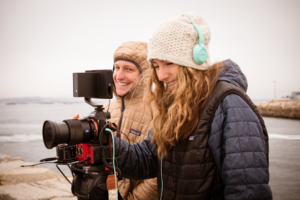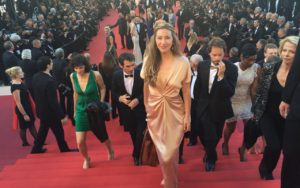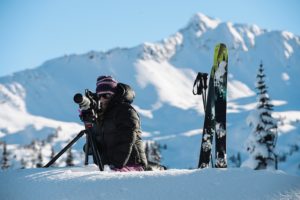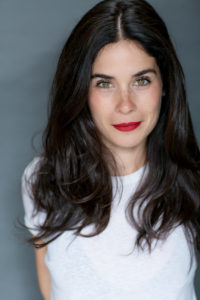By Alex Duncan
@anarmyofhearts
I was introduced to Darcy Hennessey Turenne last spring as someone who might be able to teach me a thing or two. Turenne is a fellow female filmmaker who, at the time, was treading through the murky waters of completing her first feature-length documentary film, The Moment.
Since this inaugural meeting we have made a ritual of meeting over vegan cuisine, peppered with inspiration. I watched her journey out of the muck and into a film release at The Whistler Film Festival, followed by a 60-city, sold out film tour. At our most recent meet-up, Turenne and I chatted about how her origins as a professional athlete paved her path to self-expression and storytelling.
To call her a strong, inspiring, female creative powerhouse would be an understatement.
Loose Lips: Tell me about your life as a professional athlete.
I became a professional athlete when I was eighteen. I started mountain biking when I was twelve on Vancouver Island. I began to race and eventually was racing on the National Team, which meant that I was racing internationally. After a while, I decided to quit and become a free-rider—
(at this early point in the interview, I had to interrupt to admit that I didn’t know the difference between downhill mountain biking and free-riding, so couldn’t fully comprehend what this shift meant for Turenne and her career as an athlete and so, sheepishly, I asked.)

LL: Can you tell me what the difference is between downhill mountain bike racing and this elusive sounding free-riding?
Downhill mountain biking is racing; I would maybe compare it to ski-racing. There is a set course and time and you participate in a race and try to be the fastest. And, to be honest, after a while, I found it totally boring. I mean, it’s fun, but it’s quite monotonous and non-expressive—you’re just trying to go fast and that’s it.
(This is the point in the interview where I let out a strange burst of nervous laughter, realizing that Darcy’s definition of monotonous differs greatly from my own whereby I have maybe worn the same grey sweater for 30 days straight and am addicted to eating only cinnamon-raisin toast.)
Free-riding is essentially exactly how it sounds: you go and do extreme things – jumps, big mountain lines and tricks – you get to express yourself on a bike more and it’s documented on film or photographed. So, to be a professional free-rider, it is largely exposure based. These days, much of this has to do with social media but back when I started, it was more about getting on the cover of a magazine, having an article written about you or being featured in a mountain bike film, which, at that time, were always predominantly male. So, I went that route because there were no women perusing it, I thought to myself: “All of these guys are travelling around the world doing these articles for magazines—why can’t I do that?” I really had no idea what I was doing, I was just young and enthusiastic.
LL: So, what caused you to shift from being a professional free-rider to exploring making films. It’s like the documented becomes the documentarian…
Ha. Yes. Well, mountain biking is extremely dangerous so after several years of doing it, I’d had plenty of injuries and finally had one that required major ankle surgery. After this, I had to take to take about two years off the bike. In that time, I went back to school to do my masters in International Communications and that allowed me to study film as I wanted to do a documentary as my thesis. So, I went to Indonesia to film my first project for my masters which is on female athletes and how social gender barriers prevent them from getting into sports. I was sort of a one woman show—I had just learned to use a camera and flew to Indonesia and knew nothing but read a lot of film theory and taught myself a bunch with YouTube tutorials and basically was just so young and ignorant that I didn’t realize how much I was screwing up because I was just so excited to make it. I lived there for three months, surfed everyday and made a film: it was pretty much the best time of my life.
After I made that documentary, I was hooked. I began to get commercial jobs from companies that previously sponsored me. I retired from mountain biking pretty much right away—this was a new rush.

So, now all of these experiences have led to the build of of making your first full-length feature documentary. Can you tell me about it?
Of course! My film, The Moment, is the inception story of free-ride mountain biking, which I shot, edited, produced and marketed and basically figured out entirely—
LL: (I interrupt) It sounds like you’re still a one woman show…
Yes, very much so. It was released at The Whistler Film Festival in December and closed the festival on December 8th.
LL: When was this idea born and can you tell me about the film?
The idea presented to me – the idea of making a film about the inception of free-ride mountain biking because surfing has an inception story, so does skateboarding and climbing, and all of these sports have these really great films attached to the stories but mountain biking didn’t have a film because it wasn’t old enough yet and now it’s finally old enough. So, one of the guys that made some of the first free-riding videos and has all of this archival footage came to me and said, “The time is now. The history is old enough to be relevant.” So, he hired me as a filmmaker for the project but then eventually, he backed away from the project because he had other stuff come up and I just continued on my own and, basically did the work of, like, twenty people. I didn’t have the financial resources to hire another producer so I just sucked it up and did it all myself.
LL: Wow. You must have learned so much.
I learned what not to do. And what to do. It was such a monumental pass. Now, when I’m faced with smaller commercial edits, I feel okay to do it all. I feel a lot more confident in my skills having gone through that – not that it was easy – but I definitely learned a lot and feel that I can take on a lot larger projects now.

LL: Looking back, do have any final thoughts on what this project has meant to you?
Mountain biking gave me a lot – it taught me so much. I got to travel the world and learn about myself and confidence as a young woman; this felt like a good way to give back. To be able to tell its history.

Alex Duncan is a freelance writer, professional actor and author of the children’s book An Army of Hearts. She enjoys spending time in the forest with her dogs, Maddie and Scout, and often thinks in rhyme.




